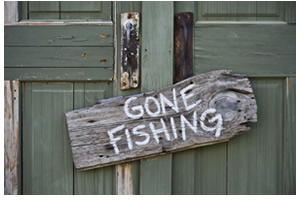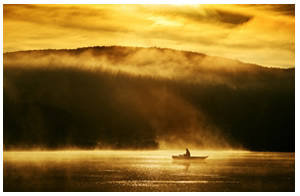How to Stay Safe on Your First Solo Fishing Trip
 While a group fishing trip promises good times — angling certainly pairs well with laughing, drinking, and story-telling — most fishers will tell you that there is no better way to relax and recharge than by experiencing the waters completely solo. Indeed, fishing alone allows a person to connect with nature on a fundamental level; without the distractions of daily life and other people, one can nestle into one’s thoughts and enjoy the outdoors uninhibited.
While a group fishing trip promises good times — angling certainly pairs well with laughing, drinking, and story-telling — most fishers will tell you that there is no better way to relax and recharge than by experiencing the waters completely solo. Indeed, fishing alone allows a person to connect with nature on a fundamental level; without the distractions of daily life and other people, one can nestle into one’s thoughts and enjoy the outdoors uninhibited.
However venturing out on a solo fishing trip also poses some dangers: There is little room for error when all of the responsibilities for survival rest on your shoulders alone. Thus, in order to ensure a fun, refreshing fishing trip, follow these four sweet and simple steps.
1. Pack Your First Aid Kit
There is no time a well-stocked first aid kit is more important than when you are by yourself. A properly packed kit marks the difference between a safely healed cut and a deadly infected wound. You can find a handful of fishing-specific first aid kits at sports equipment stores or hunting and fishing retailers; however, these curated packs cost upwards of $100 and may contain unnecessary items. Instead, you can assemble your own kit for much cheaper, but make sure you include all of the following items:
- Adhesive dressings and bandages
- Non-adhesive dressings and bandages
- Latex gloves
- Saline solution
- Scissors
- Antiseptic cream and gel
- Sun block and sunburn relief cream
- Insect repellant and itch relief cream
- Tweezers
- Cotton balls
In recent years, satellite phones have become an indispensable tool in the lone fisher’s first aid kit. Unlike cellphones, which rely on ground-based relay, sat-phones connect through a chain of satellites that are continually orbiting the Earth. Fishers who travel to remote locations, especially the seas between Caribbean islands, swear by the immaculate reception of sat-phones, and most won’t leave home without their trusty handheld. Even commercial fishers are bringing sat-phones on their maritime excursions — granted, as a means to quickly sell their daily catches rather than as a safety precaution.
Anytime you are by yourself in a strange or wild area — which includes foreign cities as well as familiar ponds — you should bring along a reliable means of communication. Accidents can happen anywhere, but they become especially traumatic when you don’t have access to emergency aid. A satellite phone in your tackle box provides this trustworthy link to civilization to keep you feeling secure no matter how far from home you row. Plus, it isn’t hard to learn how to rent a satellite phone, which can keep costs low for infrequent fishers.
2. Know Where You’re Going
 For an ideal outcome, you should select a destination you are already familiar with for your first solo trip. This will significantly cut down on opportunities for you to become disoriented or lost — or even disappointed by a lack of fish.
For an ideal outcome, you should select a destination you are already familiar with for your first solo trip. This will significantly cut down on opportunities for you to become disoriented or lost — or even disappointed by a lack of fish.
However, if you have your heart set on trailblazing for your first trip alone, you absolutely must thoroughly research the area you select. You must know the names and locations of popular hiking trails and be able to identify various flora and fauna of the region. You should be able to find this information — as well as aerial shots of the location — online. In case your knowledge fails while you are on the trip, you should have a topographic map of the region handy in your pack.
3. Double-Check Your License and Registration
Fishers know that licenses are absolutely mandatory on any fishing trip, but the process of obtaining one can vary from laughably easy to frustratingly impossible. Most fishers can procure licenses online from state websites, but if you are planning a solo trip outside the U.S., you may need to do extra detective work to obtain the right legal documents. Even after you’ve acquired your license, check it twice to make sure the date and location are accurate for your trip. Fines for fishing are totally avoidable with the right forethought.
4. Pack Light and Warm
You will be the only one available to carry tackle boxes, duffel bags, and camp gear, so you must be mindful of every ounce you stuff into your travel packs. The more time and energy you spend lugging your luggage from the car to the water, the less time and energy you will have to fish. You can find lighter-weight supplies available from most outdoors shops, but the best advice is to cut down on the stuff you pack in the first place. Still, you should never neglect to bring emergency supplies, as these are a must for any outdoor excursion.
Another note on packing: You should plan for poor weather, even if the forecast predicts otherwise. There is little else that can upset a fishing trip as thoroughly as being unprepared for cold or wet weather. Temperatures on the water are always lower than they are on land, so you should bring warm clothing that will keep you dry.
